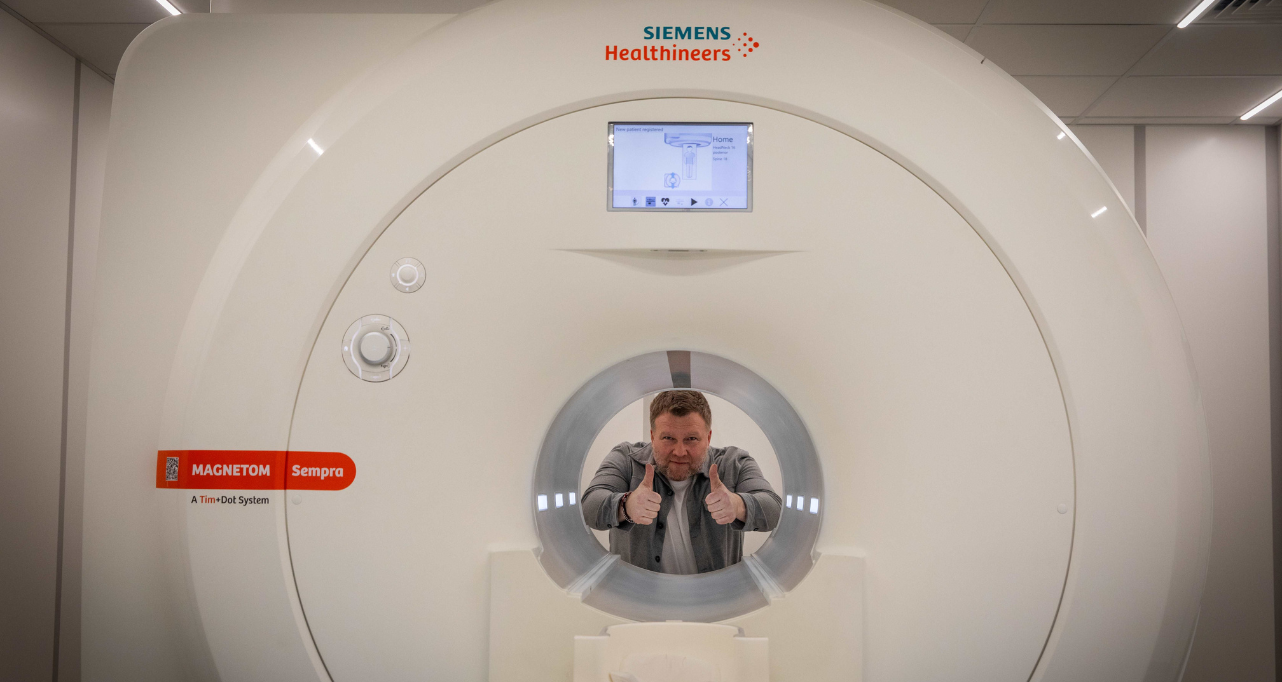If you ask people on the streets of Chernihiv what “Tesla” means, they won’t mention electric cars. For locals, Tesla is a trusted medical clinic known for high-quality diagnostics and compassionate care. And behind it stands Serhiy But, a former geophysicist whose journey from academic uncertainty to healthcare pioneer is as bold as it is inspiring.
“I graduated with a degree in geophysics and didn’t know what to do next,” Serhiy recalls. “I registered a company – Tesla. I was doing my thesis on magnetic field exploration, and they are measured in teslas. That’s where the name came from. At the time, I didn’t even know what the business would be.”
After a sports injury in 2007, Serhiy faced a frustrating search for a quick, high-quality magnetic resonance imaging (MRI) scan in Kyiv. “There was clearly a need in Ukraine for better diagnostic services,” he says. A friend in the United States helped find second-hand MRI and CT equipment from a hospital affected by the 2007 financial crisis. Despite having no experience, Serhiy took a chance: “I said let’s buy it. We’ll figure it out.”
So the Tesla clinic installed its first machines in 2008 in Chernihiv municipal clinic and began operating as a diagnostic room. But the real transformation came in 2011 when Serhiy launched a standalone clinic under the Tesla name. “At the beginning, there were just two people – one doctor and one MRI operator,” Serhiy remembers. “Today, we’re a team of over 200.”
Another turning point was in 2018, when the clinic’s rapid growth demanded more structure. “We didn’t even have a customer relationship management (CRM) system or contact centre,” Serhiy explains. “That’s when we found out about the EBRD and European Union (EU), who helped us find the consultant for our CRM project and covered 50 per cent of the costs. That changed a lot for the business development.” With new systems in place, Tesla was able to better communicate with patients, optimise costs, analyse sales and plan strategically.
Yet nothing could have prepared them for what came next.
When Russia started its full-scale invasion in 2022, Chernihiv found itself nearly surrounded. Serhiy had been abroad with his family on holiday when the war started. He returned to Ukraine, after relocating his wife and children to a safer place. His team on the ground acted fast. “The whole management team stayed in the city, they set up shelter in the basement of their clinic, provided free medical care online and offline for Chernihiv citizens and even supported hospitals with supplies,” he says. “Our call centre kept working even during the blackouts.”
Their old MRI machine, nearly 20 years old, barely survived the prolonged power outages. “We were lucky. If the machine had lost cooling, that would have been the end of it. But somehow it kept going.” When the clinic reopened in April 2022, it was the only working MRI scanner in the city.
“After the beginning of the war, we opened a new department in Nizhyn. But I wanted to go further,” Serhiy says. While visiting his family in Finland, he saw a Scandinavian clinic that inspired him to create a flagship centre back in Chernihiv – modern, welcoming and energy-efficient.
To bring that vision to life, he needed new MRI equipment. The existing machine, which had carried the clinic through crisis, was outdated and consumed a lot of energy. “We found a Siemens model from Germany – brand new. But it cost around €700,000.” They received financing from Ukrgasbank, and through the EU4Business-EBRD Credit Line – a joint initiative of the EBRD and EU – Tesla received a 15 per cent grant to help cover the cost.
The new machine changed everything. “It doubled our capacity. The old one was quite slow and broke often. This one is fast, reliable and uses only a third of the energy.” The difference in operating costs is dramatic: the old MRI used 80 kWh, while the new one just 15-25 kWh. Helium refills had to be done twice a year, costing US$ 50,000 each and now it is required just once every five years.
The EBRD and EU support also allowed Tesla to secure energy independence. “We were dealing with blackouts three times a day while receiving our most expensive medical equipment,” Serhiy says. “Without that compensation, we wouldn’t have installed generators and other equipment to support the work of our clinic.”
In 2024 Tesla opened its fourth and largest clinic – more than 1,000 square metres in Chernihiv, with sleek Scandinavian design and a strong focus on simplicity and patient comfort. “Medical spaces are often cold or intimidating. We wanted to create something different – modern, human, warm.”
“We do things that didn’t exist here before,” he continues. “I get energy from seeing positive reviews – when people say ‘yes, this is a really good service’. That inspires me. And I am really proud of the Tesla clinic team, which we were creating here in our north region of Ukraine over the last 15 years – professional, client oriented, European.”
Serhiy finishes his story with a quote from Winston Churchill: “An optimist sees the opportunity in every difficulty.”
“War is terrible,” Serhiy says. “But we’ve turned some of these challenges into an opportunity with our team and partners such as the EBRD and EU.”




